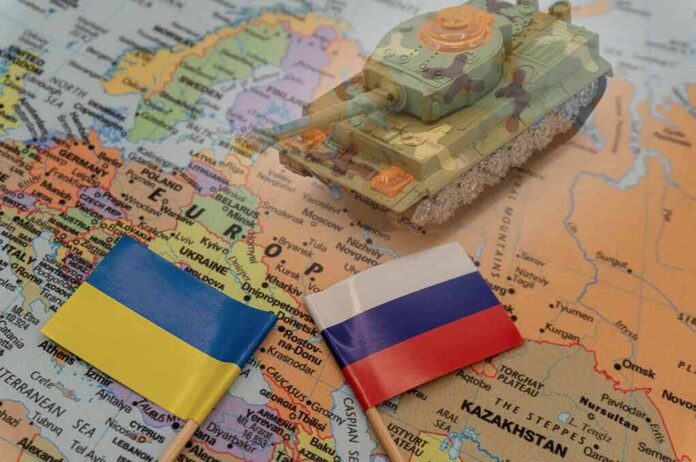
Ukraine stands firm on territorial integrity, challenging Russia’s aggressive expansion, while seeking diplomatic means to end conflict.
Quick Takes
- Ukraine refuses to cede territory occupied by Russia.
- Dialogue and peace efforts face skepticism due to geopolitical complexities.
- U.S. and European nations support Ukraine militarily and diplomatically.
- Trump’s peace strategies questioned for perceived alignment with Putin.
Ukraine’s Non-Negotiable Stance
Ukrainian President Volodymyr Zelenskyy made it clear that Ukraine will “never cede” its territories seized during the ongoing conflict. This position highlights Ukraine’s unwavering commitment to protecting its sovereignty and territorial integrity against Russian encroachment, demanding a full withdrawal. European allies back this stance, reiterating their military and diplomatic support and emphasizing the need for a unified front against Russian aggression.
Volodymyr Zelenskyy voiced concerns about external peace initiatives, particularly those led by President Donald Trump. The Ukrainian President suggested Trump’s peace efforts could be influenced by Russian President Vladimir Putin, calling into question the potential effectiveness and intentions behind these negotiations. “Donald Trump tried to create good diplomatic relations with Russia. But this kind of method doesn’t work with a man like Putin,” Zelensky remarked.
The Geopolitical Landscape of Conflict
Complications in peace negotiations arise from the static nature of the battlefield, as acknowledged by Ukrainian military commander Valerii Zaluzhnyi. The conflict’s current state is one of positional warfare, risking prolonged periods of attritional fighting. European and U.S. stakeholders continue to emphasize diplomatic methods, attempting to navigate through these complex international dynamics.
Several Western leaders, including UK Foreign Secretary David Lammy and French President Emmanuel Macron, are advocating for peace talks. Lammy notably called for an unconditional ceasefire, while Macron pressured Russia to accept a temporary pause in hostilities. These efforts underscore the global desire for a resolution, even if establishing lasting peace remains elusive amidst geopolitical intricacies.
Impact of the Conflict and the Role of Global Powers
The Russian-Ukrainian conflict has exacted a heavy toll on the region, manifesting in human casualties and severe economic repercussions for Ukraine. Former U.S. chairman of the Joint Chiefs of Staff, Mark Milley, warned that “victory is probably not achievable through military means,” encouraging more diplomatic endeavors to complement military support and bring about meaningful resolution.
Both U.S. Secretary of State Marco Rubio and President Trump implied that dialogue remains central to finding a sustainable peace agreement, despite the varied political opinion on the ground. Collective international support for Ukraine, including sanctions against Russia, aims to exert pressure on Moscow to reconsider their aggressive stance, with the potential for a peacekeeping presence also being explored.
Sources:
- It’s Time for Ukraine to Accept an Ugly Peace
- Zelensky says Putin trying to drag out talks on Ukraine ceasefire to continue war – BBC News
- Zelensky Says Ukraine Will ‘Never Cede’ Occupied Territories to Russia












